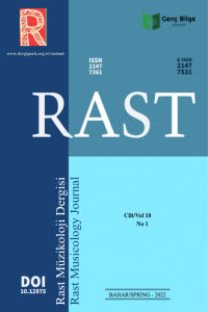Reflection of Christian ideological orientation through liturgical symbolism in P. Tchaikovsky's opera music
P. I. Tchaikovsky, elements of Christian culture, liturgical symbolism, the opera "The Maid of Orleans", the opera "Iolanta"
Reflection of Christian ideological orientation through liturgical symbolism in P. Tchaikovsky's opera music
P. I. Tchaikovsky, elements of Christian culture, the opera "The Maid of Orleans", liturgical symbolism, the opera "Iolanta",
___
Cherkashina, M., (1994). Tchaikovsky – “The Maid of Orleans”: The problem of the genre and the specific treatment of the subject. International Journal of Musicology, 3.Hertz, H. (1883). Daughter of King Rene / transl. by F. B. Miller. Russian Bulletin. E.
Hertz, H. (1850). Daughter of King Rene. Pantheon and repertoire of the Russian stage, No. 2, Book 4.
Labik, T. (2016). Ukrainian element at the creative thinking and musical movement of P. Tchaikovsky (on the example of the opera work of the composer). Thesis for the degree of "Master". Lviv National Music Academy named after M. V. Lysenko. Lviv.
Makarova, A. L. (2017a). Tchaikovsky: author. dis. for Cand. of Art History. Ural State Conservatory named after M. P. Mussorgsky. Ekaterinburg.
Makarova, A. L. (2017b). Tchaikovsky: dis. for Cand. of Art History: 17.00.02 / Ural State Conservatory named after M. P. Mussorgsky. Ekaterinburg.
Pribegina, G. A. (1983). Peter Ilyich Tchaikovsky. Moscow: Music.
Schmemann, A. prot., (1996). Introduction to Liturgical Theology. Moscow: Krutitskoe Patriarchal Compound.
Sitarskaya, Y. (2006). Religious and ethical issues and stylistic processes in Russian opera in the last third of the XIX - early XX centuries: M. Musorgsky, M. Rimsky-Korsakov: dis. for Candidate of Art Studies. 17.00.01 / National Music Academy named after P. I. Tchaikovsky. Kiev.
Tchaikovsky, P. I. (1987). Iolanta: lyric opera in one act, libretto by M. Tchaikovsky based on the drama by H. Hertz "The Daughter of King Rene". Arranged for singing and piano by S. Taneyev. Moscow: Music.
Tchaikovsky, P. I. (1979). "The Maid of Orleans" Opera in 4 acts, 6 scenes. Libretto by P. Tchaikovsky after F. Schiller - V. Zhukovsky, J. Barbier and O. Merimee. Clavier. Leningrad: Music, Leningrad branch.
Tchaikovsky, P. I. (1879). Correspondence with von N. F. von Meck., part 2. Letter 184. http://www.tchaikov.ru/1879-184.html
Tchaikovsky, P. I. - N. F. von Meck (2007). Correspondence, 1876-1890. In 4 volumes. Chelyabinsk: MPI, T. 1. 1876-1877.
Tchaikovsky, P. The Queen of Spades. Opera in 3 acts and 7 scenes. Libretto by M. Tchaikovsky. Orchestral score (in 16). Moscow: P. Yurgenson's music printing.
Tchaikovsky, P. (1940). Cherevichki: comic-fantastic opera in 4 acts (8 scenes). Libretto by Y. Polonsky. Clavier. Moscow - Leningrad: State Musical Publishing House.
Trubetskoy, E. I. (2011). The sense of life. Moscow: Institute of Russian Civilization.
Varavkina-Tarasova, N. (2018). Aria of Joanna d'Ark No. 7 from the opera "The Maid of Orleans" by P. Tchaikovsky: spiritual symbolism of the canon of repentance during the "probation under the sign". Problems of interaction, education, pedagogy and theory and practice. Cognitive music knowledge: collection of scientific articles of KhNUM named after I. P. Kotlyarevsky. Kharkiv: KhNUM named after I. P. Kotlyarevsky.
- ISSN: 2147-7361
- Yayın Aralığı: Yılda 4 Sayı
- Başlangıç: 2013
- Yayıncı: Genç Bilge Yayıncılık (Young Wise)
Azerbaycan folklor türlerinden olan “meyhana”nin diğer halaklarin müzik türleriyle benzer yönleri
Kira MAİDENBERG-TODOROVA, Olena KHOROSHAVİNA, Inna HODİNA, Olga VORONOVSKAYA
Kateryna NEMCHENKO, Larisa LOBODA, Anatoliy NOSULYA, Olena KUCHMA
Fasıl Tarihinde Dönüşüm ve Direklerarası Fasıl Refakat Gelenekleri
Bekir Şahin BALOĞLU, Bedirhan BÜYÜKDUMAN
İlkokul düzeyinde etkin müzik öğretim yöntemlerinin analizi: Rusya örneği
Marina PEREVERZEVA, Natalia ANUFRİEVA, Anna SHCHERBAKOVA, Elena KUZNETSOVA, Alena ZHARKOVA
Türkiye popüler müziğinin salt müziksel eğilimleri 2007-2017
Onur KARABİBER, Songül KARAHASANOĞLU, Elif YAVUZ
Kateryna NEMCHENKO, Larisa LOBODA, Anatoliy NOSULYA, Olena KUCHMA
Yeni kaynaklar ışığında yeni bir Rauf Yekta Bey biyografisi
Duygu TAŞDELEN, Nilgün DOĞRUSÖZ DİŞİAÇIK
Expressive piano technic: basics of healthy movement, technic and interpretation
Nevbet-i Müretteb’in farklı coğrafyalardaki izleri üzerine bir inceleme
